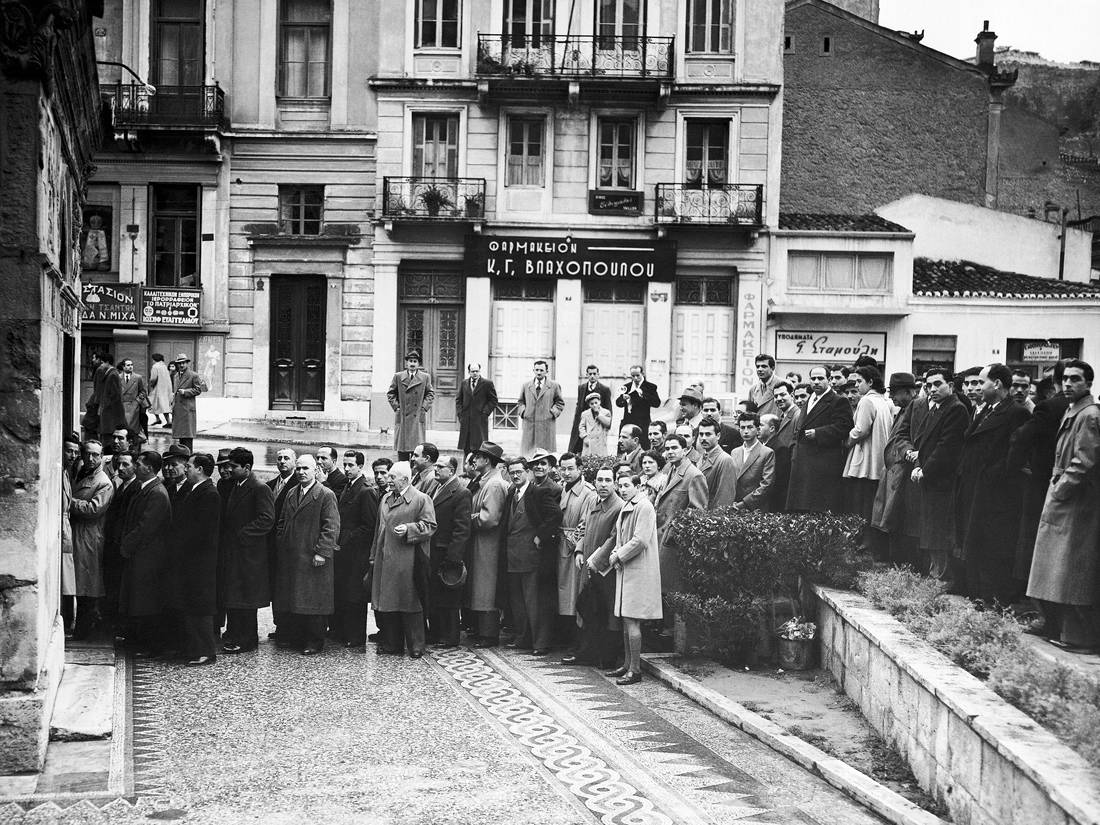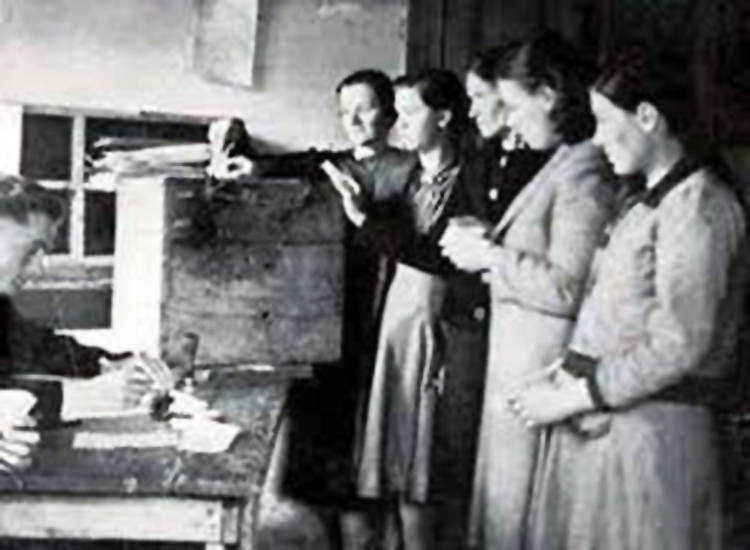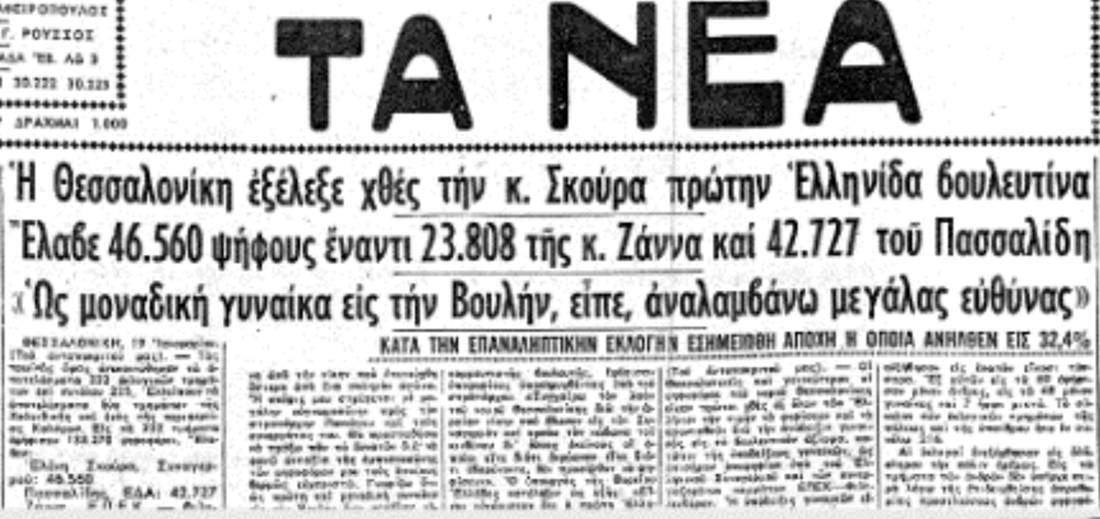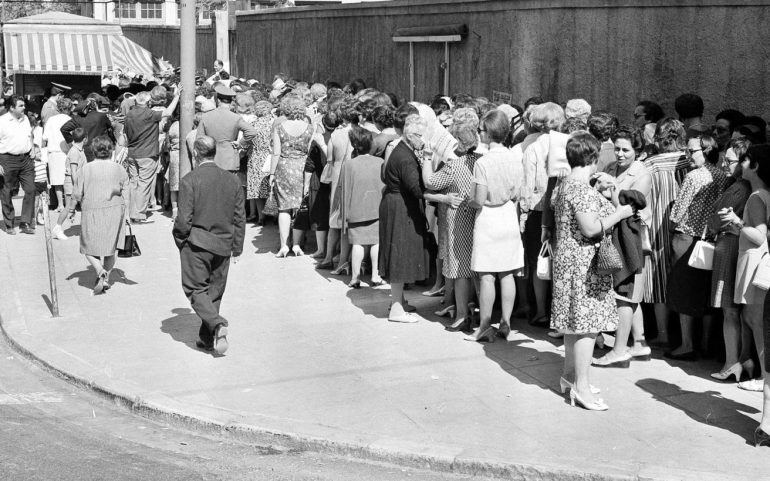The introduction of women's civil rights was perhaps the biggest thorn in the side of a male-dominated society, a headache that made it clear at some point that Western countries could not insist on ignoring it.
The European countries They slowly and always reluctantly began to legislate in favor of the female vote, in an atmosphere of strong reactions and strong counterattacks.
In our country, the introduction of male universal suffrage was already legislated by the Constitution of 1864. When would Greek women vote for the first time in national elections; Nearly 100 years later!
And they almost did not vote. And when they did, the men sat down in their homes to protest.

Even the first post-war Constitution of Greece in January 1952 did not directly guarantee the equality of women, as had been done for men, ie with the Constitution of 1864. Nevertheless, a few months later, in June 1952, Law 2159 was passed, which awarded Finally, the Greek women's coveted right to vote in the parliamentary elections.
A move that brought unrest to the political scene and the objections were moving in the dipole of the comedic-tragic. Only it was deemed preferable for Greece to comply with the international conventions it had signed.
The Greek woman was ready for the first formal vote. After all, the parliamentary elections were coming at a rapid pace, as they were scheduled for November 1952. But would a woman vote in those elections? No, as the familiar pathogens of our people, the ubiquitous bureaucracy, made their appearance.
He says they did not manage to register them in the electoral lists, so the women's vote had to be postponed for the next time! Which, however, by its good fortune, would not be late at all.
Of course, this was not the first contact of the podium with the celebration of democracy. You see, the Greek woman has been voting in the municipal elections since 1934. She experienced the ballot box for the first time on February 11, 1934, in that landmark local government derby that took place in an atmosphere of unimaginable polarization.

Venizelists and anti-Venizelists literally gave it their all, but the ruling People's Party of Panagi Tsaldari won the impressions, prevailing in the three major municipalities of the country.
However, that municipal and community confrontation is mentioned for its two historical firsts: it was the first time that a woman took part in the ballot box, but also the first time that the KKE had such an enhanced presence in municipal affairs, electing two mayors (Kavala and Serres ) and bringing representatives to more than 60 city councils across the country.
Returning to the Greek women, not all of them had the right to vote, except those who had turned 30 and had in their hands some educational paper, even a high school diploma. What did that mean? How the woman's participation rates were tragically low. His electoral lists Municipality of Athens, for example, hosted only 2.655 ladies, of whom only… 439 arrived at polling stations.
In the "trifles" of our history, not all Greek suffragettes were. They did not all want to take part in the commons, everything else. Emblematic here is our great actress Marika Kotopouli and her violent refusal to vote, saying that proverbial saying that only the ugly or those who avoid having children seek a vote!
The years passed and we reached 1952, when it became clear that Greece could not ignore international events for a long time…

With these and other things, we have reached 1952, when women are happy to vote in national elections, but we do not succeed! This was indeed the reasoning, that they did not have time to register them in the electoral registers and to update the lists.
His caretaker government judicial Dimitrios Kiousopoulos suspended the right of women to vote, despite its constitutional guarantee, causing chaos and division in the political system.
The Greek women, however, would not wait four years to reach the ballot box. They would take part in the by-elections of the Prefecture of Thessaloniki on January 18, 1953. This was the first time that the Greek voter would have the honor of electing the representatives of her choice. But also to be elected!
The candidates you see in this election race were Virginia Zanna (EPEK-Party of the Liberals), Eleni Skoura of the Hellenic Alarm and the three independent candidates Meropi Vasilikou, Stavroula Costopoulou and Angeliki Tsakonas. On February 2, 1953, Eleni Skoura became the first Greek woman to cross the threshold of Parliament as the first ever MP.
"The people of Thessaloniki, and the voters of the Prefecture of Thessaloniki in general, were the first of all Greeks yesterday to have the honor to vote and fight for the nomination of a woman in the parliamentary office, following the nomination of women as official candidates by the Hellenic Alarm and collaborators of EPEK-Liberal parties ", write" Ta Nea "the next day (January 19, 1953), hastening to note:
"The nomination of women had certainly displeased a portion of men who, although they accepted the granting of the right to vote to women, nevertheless consider it excessive to give at the same time to the weaker sex and the right to vote. This was otherwise evident from the significant abstention of men from voting. […] There was no order in the men's sections due to the reluctance of male voters to show up. In the women's sections, however, on the contrary, the attendance was denser and the movement more lively, of relative fanaticism observed ".

"I will do my best to show the trust of my constituents, whom I thank very much. I know that as the first and only woman in Parliament I have a great responsibility and many duties. "There are many things we must do in favor of Greek women, especially in the field of social welfare", said modestly and humbly in the same paper the deputy Eleni Skoura after her historic election.
The first regular parliamentary elections in which women from all over Greece took part were the national elections of 1956 (February 19) with the proverbially complicated electoral system that gave victory to Constantinos Karamanlis. Despite the fact that the opposition won a majority of 48,15% (1.620.007 votes), it won far fewer seats (132) than Karamanlis' EPE, which eventually formed a government with a comfortable parliamentary majority of 165 seats and a turnout of 47,38. , 1.594.112% (XNUMX votes).
In the government he formed, the prime minister hastened to include the elected Lina Tsaldari, widow of the historical leader of the People's Party, Panagi Tsaldari, giving her the portfolio of the Ministry of Social Welfare, as a dual symbol of continuity and continuity.
In the municipal elections of the same year, the first woman mayor is elected! She was Maria Desylla-Kapodistria, great-granddaughter of his brother Ioannis Kapodistrias and wife of the Corfiot industrialist and mayor Stamatios Desyllas, who solemnly ran in the by-elections of the island.

The first serious debates in the Greek Parliament about the women's vote take place in 1921, when the three-time Prime Minister Dimitrios Gounaris timidly brings the issue to Parliament. The violent reactions of the opposition, however, but also of part of the coalition, cancel the discussion before it starts.
The proposal returns in 1924, but meets with the same strong resistance and we must reach February 5, 1930, when the determination of Eleftherios Venizelos and the Liberal Party votes in favor of the women's vote, which is also guaranteed by presidential decree. THE vote It concerns, of course, the limited right to vote (but not to be elected).
Women can go to the polls only in municipal and community elections, however. And only if they are over 30 years old and literate. In other words, at a time when illiteracy is sweeping and prejudices are creating scenes of infinite beauty in Greek households. The turnout of women at the ballot box is not exactly satisfactory.
Only in the post-government Constitution of 1975, which was voted on June 7 by the Fifth Revisionary Parliament and established the presiding parliamentary democracy, is it finally defined that "Greeks are equal", having equal political rights and obligations.
It took decades of social struggles and protests of the feminist movement for the Greek woman to acquire the same constitutional position as the Greek. In fact, the No. 1 reason for the macho establishment against the female vote was menstruation. A vote during menstruation was considered "dangerous and repulsive"!

The newspaper "Nea Imera" writes characteristically on March 20, 1928: "Every woman is in an unbalanced and frantic state of mind on a certain day of each month. Newer and more accurate researches show that only a certain day, but not every day mental and emotional imbalance… The female vote is therefore a dangerous thing, therefore repulsive ".
Fortunately, there were also domestic ones suffragettes that is, personalities like the emblematic Kalliroi Paren, who was ridiculed, insulted, maligned, insulted, and yet she persisted and finally passed her own: the position of women in modern Greek society changed in the stubbornness of the macho.
Behind Gounaris' proposal in 1921 for a female vote was the tireless teacher, journalist and publisher of the "Ladies' Gazette", which he published for 30 whole years on his knees to the male establishment.
Parren took the lead by collecting signatures from well-known Greek women, putting pressure on Gounaris and finally forcing him to take a positive stance. He did the same to every other government, annoying even him Charilao Trikoupi as early as 1890.
On the historic day of February 11, 1934, when the female hand will hold the ballot for the first time, the slogan that vibrates the elections was this "vote for the woman", the slogan that Paren first wrote in the "Ladies' Newspaper" since 1887…
